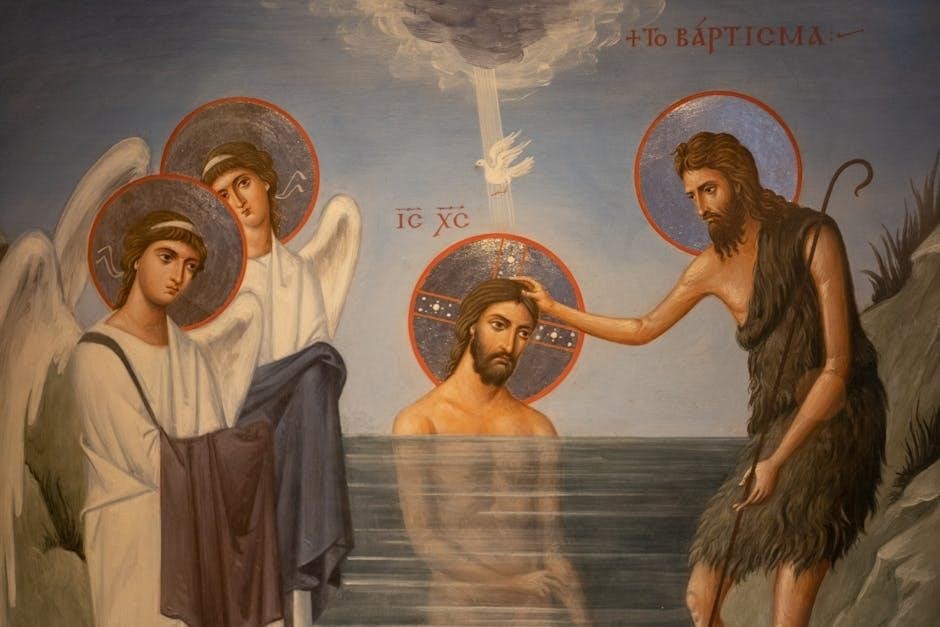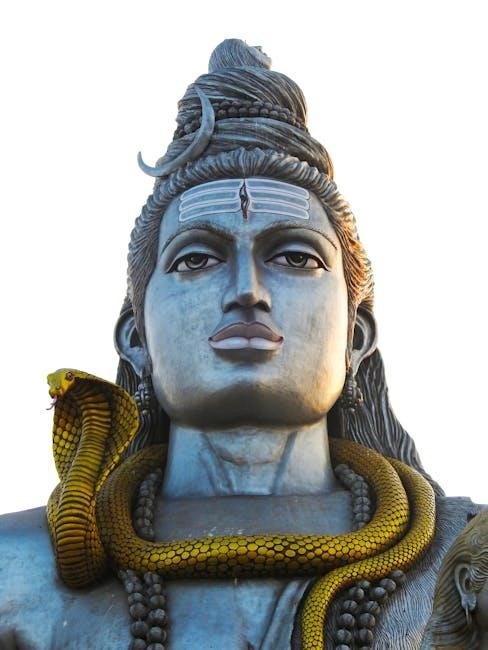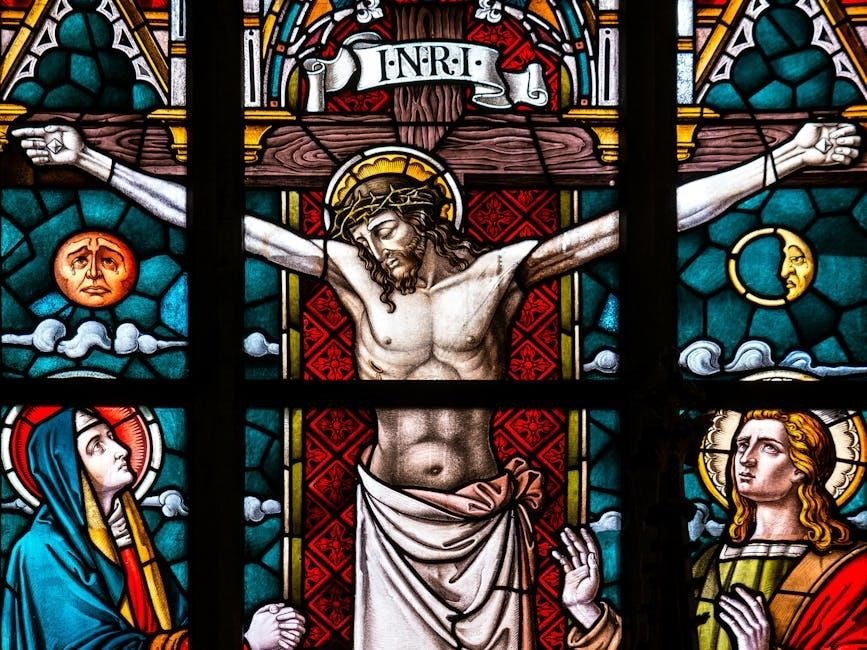Stephen Prothero challenges the belief that all religions worship the same God‚ arguing each faith addresses unique human problems with distinct divine concepts.
Overview of the Book by Stephen Prothero

In God Is Not One‚ Stephen Prothero critiques the notion that all religions fundamentally worship the same deity. He argues that religions address distinct human problems with unique divine concepts. Prothero examines eight major religions‚ including Christianity‚ Islam‚ and Buddhism‚ highlighting their differing views on God. He emphasizes that understanding these differences is crucial for meaningful interfaith dialogue. The book challenges the idea of religious unity‚ advocating instead for a deeper appreciation of theological diversity. Prothero’s work sparks important discussions about the nature of God and the future of religious tolerance in a globalized world.
Key Arguments Against the Idea of a Single God
Prothero argues that the concept of a single‚ universal God is flawed due to significant theological differences across religions. He contends that each religion presents a distinct understanding of the divine‚ tailored to address specific human concerns. For instance‚ Christianity focuses on sin and redemption‚ while Buddhism rejects the idea of a creator deity‚ emphasizing personal enlightenment. Prothero asserts that these differences cannot be reconciled under a single‚ unified deity. He also critiques the oversimplification that all religions lead to the same ultimate truth‚ emphasizing that such a view ignores the unique historical and cultural contexts of each faith.

The Concept of God in Major Religions
The concept of God varies significantly across major religions‚ reflecting diverse theological beliefs about humanity and the universe‚ highlighting the richness of global spiritual perspectives.
God in Christianity: The Trinity and Monotheism
In Christianity‚ God is understood as a single divine essence expressed in three distinct‚ coequal persons: the Father‚ Son‚ and Holy Spirit. This Trinitarian view contrasts with monotheistic concepts in other religions. Christianity affirms monotheism but interprets it through the mystery of the Trinity‚ emphasizing relational unity within the Godhead. Jesus Christ‚ as the Son‚ shares the divine nature with the Father‚ a belief central to Christian theology. This unique understanding of God’s nature shapes Christian worship‚ doctrine‚ and the relationship between believers and God‚ balancing the mystery of the Trinity with the coherence of monotheistic faith.
God in Islam: The Unity and Uniqueness of Allah
In Islam‚ God is known as Allah‚ the absolute one and only deity. Muslims adhere to strict monotheism‚ rejecting any notion of plurality or division in God’s nature. The concept of Tawhid‚ or the oneness of God‚ is central to Islamic theology‚ emphasizing Allah’s unity‚ uniqueness‚ and indivisibility. This belief is foundational to the Five Pillars of Islam and the Shahada‚ the declaration of faith. Islam distinguishes itself by rejecting the Trinity and any anthropomorphic attributes of God‚ upholding Allah as transcendent‚ omnipotent‚ and beyond human comprehension. This unique monotheistic perspective underscores Islamic worship and daily life‚ shaping a distinct religious identity.
God in Hinduism: Multiple Deities and the Ultimate Reality
Hinduism presents a complex and diverse understanding of God‚ encompassing both multiple deities and a singular ultimate reality. The religion recognizes a multitude of gods and goddesses‚ such as Brahma‚ Vishnu‚ and Shiva‚ each representing different aspects of the divine. However‚ these deities are often seen as manifestations of Brahman‚ the unchanging‚ all-pervasive ultimate reality. While some Hindus worship a single deity as the supreme being‚ others embrace the concept of Brahman‚ which transcends form and attributes. This dual approach allows Hinduism to accommodate both polytheistic and monotheistic perspectives‚ reflecting its philosophical depth and spiritual flexibility. The interplay between the many and the one remains central to Hindu theology and devotion.
God in Buddhism: The Rejection of a Creator Deity
Buddhism uniquely rejects the concept of a creator deity‚ focusing instead on the Four Noble Truths and the path to enlightenment. Unlike traditions centered on a divine being‚ Buddhism emphasizes suffering‚ its causes‚ and its cessation. The law of karma‚ not a divine will‚ governs existence. Buddha taught self-realization through the Eightfold Path‚ rejecting reliance on a supreme god. This philosophical stance allows individuals to take responsibility for their liberation‚ free from dependence on a creator deity. By dismissing the idea of a single‚ omnipotent God‚ Buddhism offers a distinct spiritual framework rooted in personal effort and understanding rather than divine intervention or worship.

Philosophical Arguments for and Against a Single God
Debates surround the concept of a universal God‚ with arguments for a single deity emphasizing moral coherence and humanity’s shared values‚ while critiques highlight contradictions in divine attributes and the problem of evil‚ challenging the notion of an omnipotent‚ benevolent being.
The Idea of a Universal God Across Cultures
The concept of a universal God is often debated‚ with some arguing that all religions point to a single divine reality. Stephen Prothero‚ however‚ disagrees‚ emphasizing that religions address different human problems with distinct divine concepts. While some cultures believe in a singular‚ omnipotent deity‚ others recognize multiple gods or reject the idea of a creator God altogether. The diversity in attributes‚ roles‚ and perceptions of God reflects cultural and philosophical differences. Despite these variations‚ the idea of a universal God persists‚ often rooted in humanity’s shared moral and existential questions. This tension between unity and diversity underscores the complexity of divine concepts across cultures.
Critiques of the Notion of a Single Divine Being
Stephen Prothero argues that the belief in a single‚ universal God oversimplifies the diversity of religious thought. He criticizes the idea that all religions ultimately point to the same divine reality‚ emphasizing instead their distinct theological differences. Prothero highlights how religions address different human problems with unique divine concepts‚ challenging the notion of a singular‚ overarching deity. This critique underscores the complexity of divine representations across cultures‚ rejecting the idea of a monolithic God. By focusing on these differences‚ Prothero encourages a more nuanced understanding of religion‚ moving beyond the assumption of a universal God to appreciate the richness of diverse spiritual traditions.

Theological Debates on God’s Nature
Theological debates question whether God is a single‚ universal being or diverse across religions. Prothero critiques the idea of a monolithic God‚ emphasizing distinct divine concepts.
God’s Attributes: Omnipotence‚ Omniscience‚ and Benevolence
God is often described as omnipotent‚ omniscient‚ and benevolent‚ meaning all-powerful‚ all-knowing‚ and entirely good. These attributes are central to monotheistic faiths‚ defining God’s nature. However‚ philosophical debates question how an omnipotent‚ omniscient God allows suffering‚ challenging the notion of benevolence. Critics argue that such contradictions undermine the traditional view of God. Prothero’s work highlights how different religions perceive God’s attributes‚ emphasizing that these concepts vary across belief systems‚ reflecting diverse cultural and theological frameworks. While some see God as a perfect being‚ others question whether such perfection aligns with human experiences of evil and injustice.
Challenges to the Traditional View of God
The traditional view of God as omnipotent‚ omniscient‚ and benevolent faces challenges from modern philosophical and scientific perspectives. Critics argue that the existence of evil and suffering contradicts the idea of an all-powerful‚ all-knowing‚ and entirely good God. Additionally‚ cultural and religious pluralism highlight diverse perceptions of God‚ questioning the universality of these attributes. Prothero’s work underscores how these challenges reflect broader theological tensions‚ urging a reevaluation of how God is understood across different belief systems. This scrutiny invites deeper exploration of God’s nature‚ emphasizing the complexity of divine attributes in an increasingly interconnected world.

Psychological and Cultural Perspectives on God
Psychological and cultural perspectives reveal that God is shaped by human experiences‚ emotions‚ and societal norms‚ reflecting diverse understandings across different communities and belief systems globally.
How Different Cultures Shape the Perception of God
Different cultures significantly influence the perception of God‚ reflecting their unique histories‚ values‚ and belief systems. While some cultures view God as a singular‚ omnipotent being‚ others recognize multiple deities with distinct roles. Rituals‚ traditions‚ and societal norms further shape these perceptions‚ creating diverse representations of the divine. For instance‚ certain cultures emphasize God’s active involvement in human affairs‚ while others see God as more detached. These variations highlight how cultural contexts mold religious beliefs‚ leading to a rich tapestry of understandings about God’s nature and role in the world. This diversity underscores the complexity of religious thought across global communities.
The Role of God in Human Psychology and Society
God plays a profound role in shaping human psychology and society‚ offering comfort‚ purpose‚ and moral guidance. Psychologically‚ belief in God can provide solace‚ reduce stress‚ and foster resilience. Societal structures often revolve around religious teachings‚ influencing laws‚ ethics‚ and community bonds. God is frequently seen as a source of ultimate truth‚ guiding human behavior and decisions. This divine influence shapes cultural norms‚ fostering unity and shared values. However‚ it can also create divisions when interpretations clash. The concept of God thus serves as both a unifying and divisive force‚ deeply embedded in the fabric of individual and collective life‚ reflecting humanity’s quest for meaning and order.

Modern Interpretations of God
Modern interpretations of God explore divine concepts through science‚ philosophy‚ and cultural shifts‚ reflecting evolving human understanding and diverse spiritual perspectives in contemporary society.
God in the Context of Science and Technology
Science and technology have reshaped perceptions of God‚ challenging traditional views of divine creation and intervention. While some see God as the first cause behind cosmic order‚ others argue that scientific explanations diminish the need for a divine being. Technological advancements‚ like AI‚ provoke questions about human limits and God’s role. The concept of God evolves‚ with some interpreting it as a metaphor for ultimate reality rather than a personal deity. This intersection of faith and reason sparks debates on whether God remains relevant in a scientifically driven world‚ influencing both theological discourse and personal spirituality in modern times.
God in Contemporary Philosophy and Theology
Contemporary philosophy and theology explore diverse perspectives on God‚ challenging traditional notions of divinity. Some scholars argue for a dynamic‚ relational understanding of God‚ emphasizing qualities like love and vulnerability. Process theology‚ for instance‚ portrays God as evolving alongside the universe. Open theism further suggests God’s knowledge of the future is relational‚ not absolute. Postmodern critiques question the notion of a singular‚ unchanging God‚ advocating for pluralistic and contextual understandings. These debates often intersect with questions of morality‚ justice‚ and human freedom. The discussion reflects a broader shift toward understanding God in light of human experience and cultural diversity‚ fostering dialogue across theological traditions.
The concept of God varies widely across religions and cultures‚ reflecting unique beliefs and values. This diversity challenges the idea of a single‚ universal deity‚ fostering dialogue and understanding.
The concept of God varies significantly across religions and cultures‚ challenging the notion of a single‚ universal deity. Christianity emphasizes the Trinity‚ while Islam stresses Allah’s unity. Hinduism recognizes multiple deities and an ultimate reality‚ contrasting with Buddhism’s rejection of a creator God. Philosophical debates question the existence of a single divine being‚ highlighting differences in human experiences and cultural influences. Modern interpretations integrate science and psychology‚ reshaping perceptions of God. This diversity underscores the complexity of religious beliefs‚ encouraging dialogue and understanding across traditions.
Reflections on the Future of Religious Dialogue
Stephen Prothero’s work highlights the need for open dialogue to foster mutual understanding among diverse religious traditions. Recognizing the unique perspectives each faith brings can bridge divides and promote tolerance. Embracing the richness of differences encourages collaboration‚ addressing global challenges collectively; By acknowledging the distinctiveness of religious beliefs‚ dialogue can move beyond superficial unity‚ toward a deeper appreciation of shared human values. This approach not only respects individual traditions but also paves the way for a harmonious coexistence in an increasingly interconnected world.
